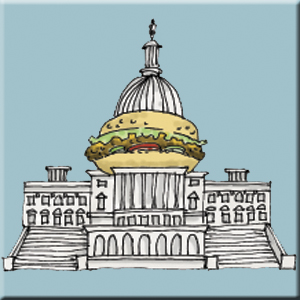Fast food has meant a slow death for thousands. Why aren't we doing more about it?
If you knew of an obvious public safety hazard that contributed to the deaths of 300,000 Americans every year-people often left to die a slow, painful, even gruesome death from heart disease and diabetes-wouldn't you expect your government to do something about it?
In 2003 the U.S. surgeon general reported that two out of three Americans were overweight and that one out of eight deaths was caused by an illness related to obesity. That's the personal cost of our obesity and diabetes epidemic, a fast- and processed-food, cattle-prodded death march through the nation's poor eating and exercising habits.
Now driving the fast-food addictees among us farther along the road to nutritional perdition is the latest craze among purveyors of fast-food crack: the one-third pound, Angus-beef calorie bomb. Our bellies will be bulging as our local health budgets are imploding.
Forty years ago, just about 4 percent of U.S. children were overweight. That rate has tripled to more than 15 percent, but as serving sizes increase yet again, government health offices issue warnings but little else. We're endangering a new generation of kids raised on addictive, so-called food.
As the dying and diabetes reach epidemic proportions, there is scant evidence that anyone in authority is seriously considering regulatory mechanisms aimed at curtailing this massive public health crisis even as it enriches a few food and agricultural conglomerates. U.S. consumers are being reduced to surplus-clearing mechanisms for U.S. commodity markets.
Why should what you put in your mouth be my business? Foremost, personal choice leads to communal cost: All taxpayers and insurance plan members pick up the tab for the vast social expenses related to obesity. But there is also growing evidence that fast-food users really can't help themselves. Like any other addiction that has invited government regulation-drugs, alcohol, tobacco-fast-food junkies need their fat and corn-syrup fix and won't stop unless someone stops them.
The government already directs food policy through a number of regulatory and market mechanisms, most notably the farm subsidy program, and a government say on a liberty as personal as the food we eat is not without precedent. We've outlawed smoking in public places. In most states motorcyclists are forced to wear helmets; passengers and drivers in automobiles are required to buckle up. Airbags have become standard equipment despite the prolonged and determined resistance of the car industry.
These measures and more like them have saved countless lives even as they've intruded on personal freedom, to the initial outrage of many. If the thousands who are dying because of our addictive food policy and the lack of transparency in food production, processing, and delivery were laid out on the shoulders of our highways, surely we would be moved to act. Unfortunately, most of the suffering and dying goes on behind closed doors in homes and hospitals and hospices across America.
Our dangerous, fat-rich and fast-food strategies are killing us, yet there is little appetite for legislation with some real meat in it aimed at controlling this addictive industry-either by containing portions or requiring greater transparency on industry practices or labeling that could better inform consumers about what it is exactly they're putting in their mouths and on their hips, thighs, and bellies.
We have built a culture around the delivery of addictive, fatty, and corn-syrupy food. Each half decade or so we pile it on a little, wafer-thin-bit higher and then are amazed at the next surge of obesity and diabetes. Maybe before we treat the addicts, we could begin by cutting out-or at least down-the source of their addiction.
When I was a child, I drank Coke like a child. That meant a 7-ounce bottle of sugar-sweetened carbonated water with caramel coloring. I've watched that serving grow to a 12-ounce can, then a 16-ounce bottle, to the new "standard" 20-ounce big gulp of corn-sweetened nothing.
Our appetites have been altered by progressively larger portions that neatly track our expanding waste-lines and the rapid growth of our obesity and diabetes treatment industries. Isn't it time we looked at the source of these problems rather than attempt to treat their expensive and woeful outcomes?
















Add comment